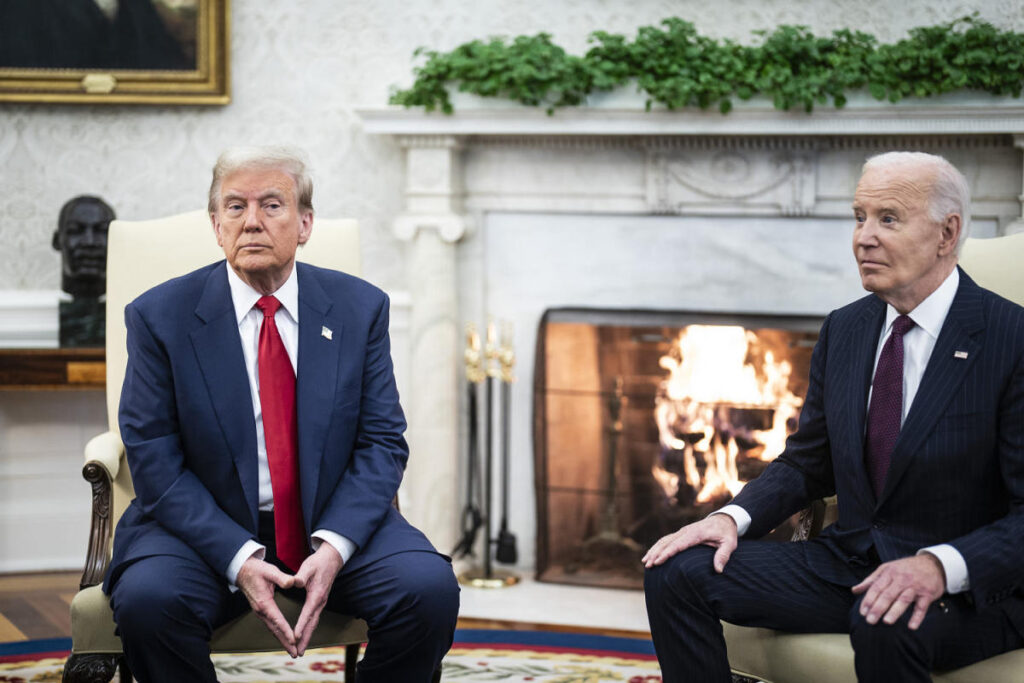In a notable development during the recent Thanksgiving holiday, President Joe Biden and President-elect Donald Trump engaged in a phone call, marking a rare instance of communication between the two leaders since the latter’s election defeat in 2020. According to sources familiar with the conversation, Trump reached out to Biden primarily to convey Thanksgiving wishes. This brief exchange is particularly significant as it contrasts sharply with the two men’s previous interactions during the last transition, where Trump notably eschewed customary protocols. The outreach from Trump signifies a potential thaw in their typically contentious relationship, at least on the surface, amidst the political backdrop leading to the upcoming inauguration.
During the Thanksgiving festivities, President Biden and First Lady Jill Biden were joined by family members in Nantucket, Massachusetts. The couple celebrated the holiday in the company of their children, Hunter and Ashley, creating a familial atmosphere. The choice of Nantucket as Thanksgiving getaway highlights the Biden family’s traditional approach to holidays, further emphasizing the personal connections that the president maintains. This year’s Thanksgiving was not only a time for family gatherings but also subtly reflected political undertones amid ongoing discussions surrounding the upcoming 2024 elections and the transitioning governance style.
When questioned by reporters about the possibility of future conversations with Trump before the inauguration, Biden expressed an expectation that they would indeed speak again. This statement underscores a sense of openness from the current president towards engaging with his predecessor, which contrasts with the experiences of the previous transition period. Notably, Biden’s invitation for Trump to visit the White House further reflects a willingness to practice civility and adherence to protocols of power transfer, fostering a spirit of cooperation and stability in governance.
In stark comparison, the transition period following the 2020 election proved tumultuous as Donald Trump refused to acknowledge the election results, which led to a protracted standoff. The Trump administration’s reluctance to facilitate a smooth transition resulted in significant delays, affecting Biden’s transition team’s ability to prepare for governance. These events marked a departure from established democratic norms and highlighted the challenges of transferring power in an era marked by political polarization. Trump’s refusal to host the incoming president at the White House stood out as a rare breach of tradition that may have further deepened the partisan divide.
The implications of the previous administration’s approach culminated in a historic moment when Trump opted not to attend Biden’s inauguration in January 2021, making him the first outgoing president in 150 years to skip the ceremony. This decision underscored the deteriorating state of political decorum and signaling between parties, as the peaceful transition of power became overshadowed by discord. The current administration, however, appears to be adopting a different stance as Biden prepares for the upcoming inauguration amid speculations of a shifting political landscape in 2024.
In the lead-up to the upcoming inauguration, White House officials, including press secretary Karine Jean-Pierre and senior deputy press secretary Andrew Bates, have noted Biden’s commitment to attending the ceremony irrespective of the electoral outcome. This intention serves as a reaffirmation of the foundational principles of democracy and the importance of upholding traditions even against a backdrop of tension and division. As the nation approaches a pivotal moment in its political timeline, the tone and nature of communications between Biden and Trump may serve as indicators of how the political climate will unfold, as both leaders navigate their respective roles in the face of an evolving electoral landscape.

